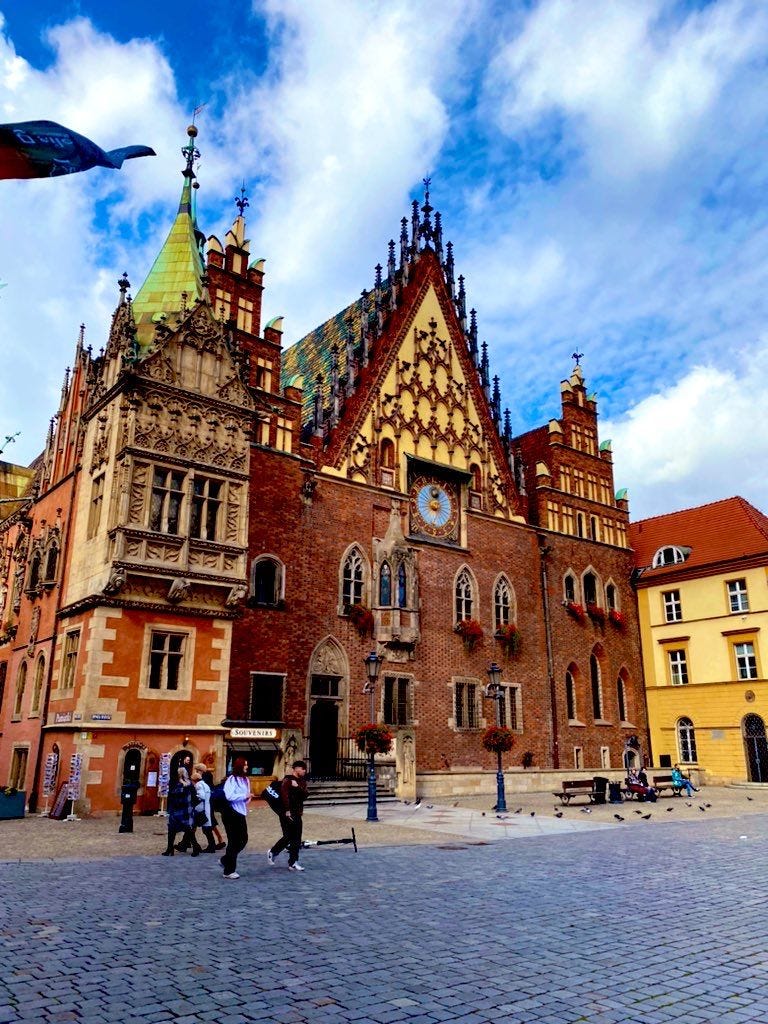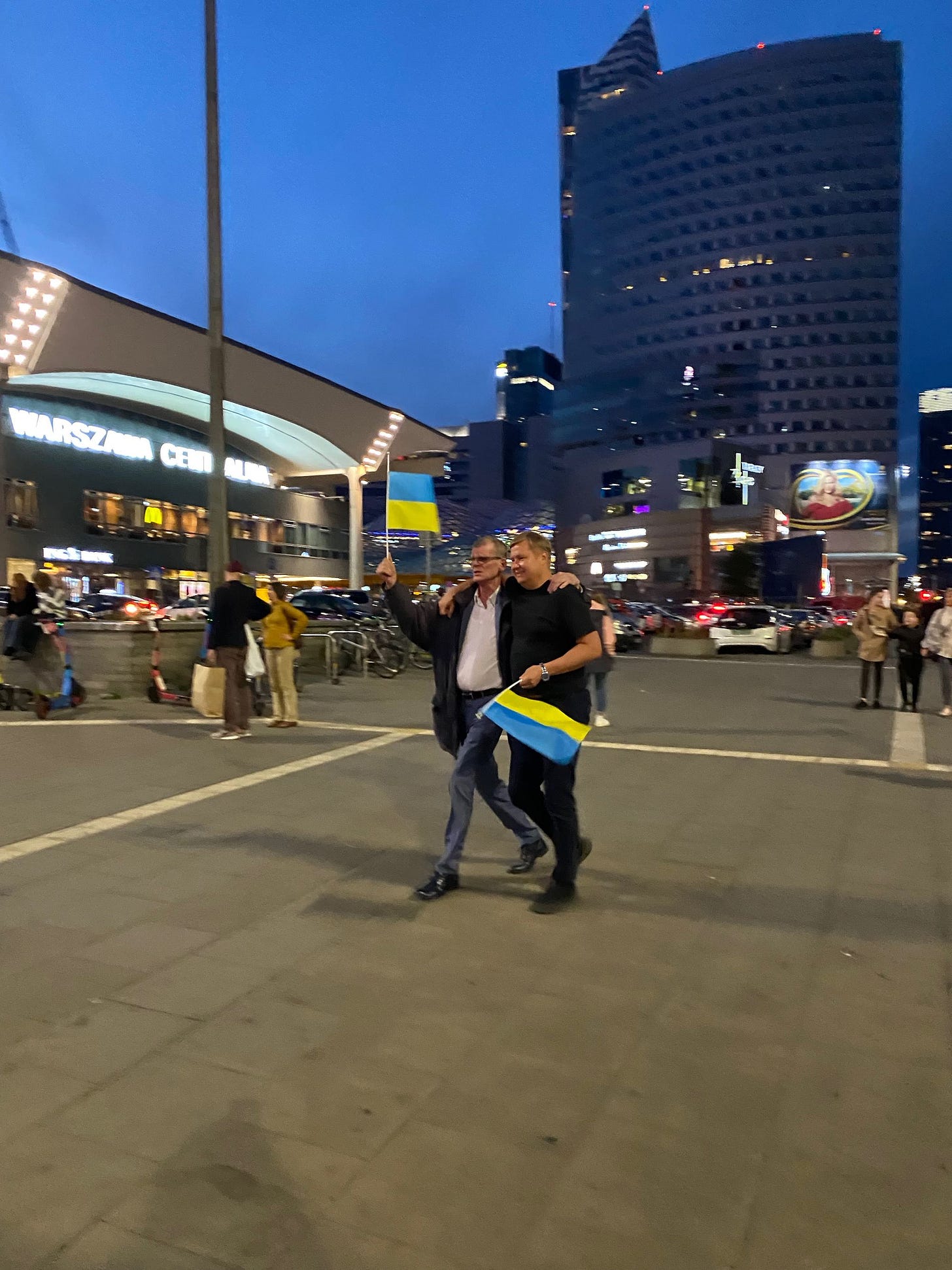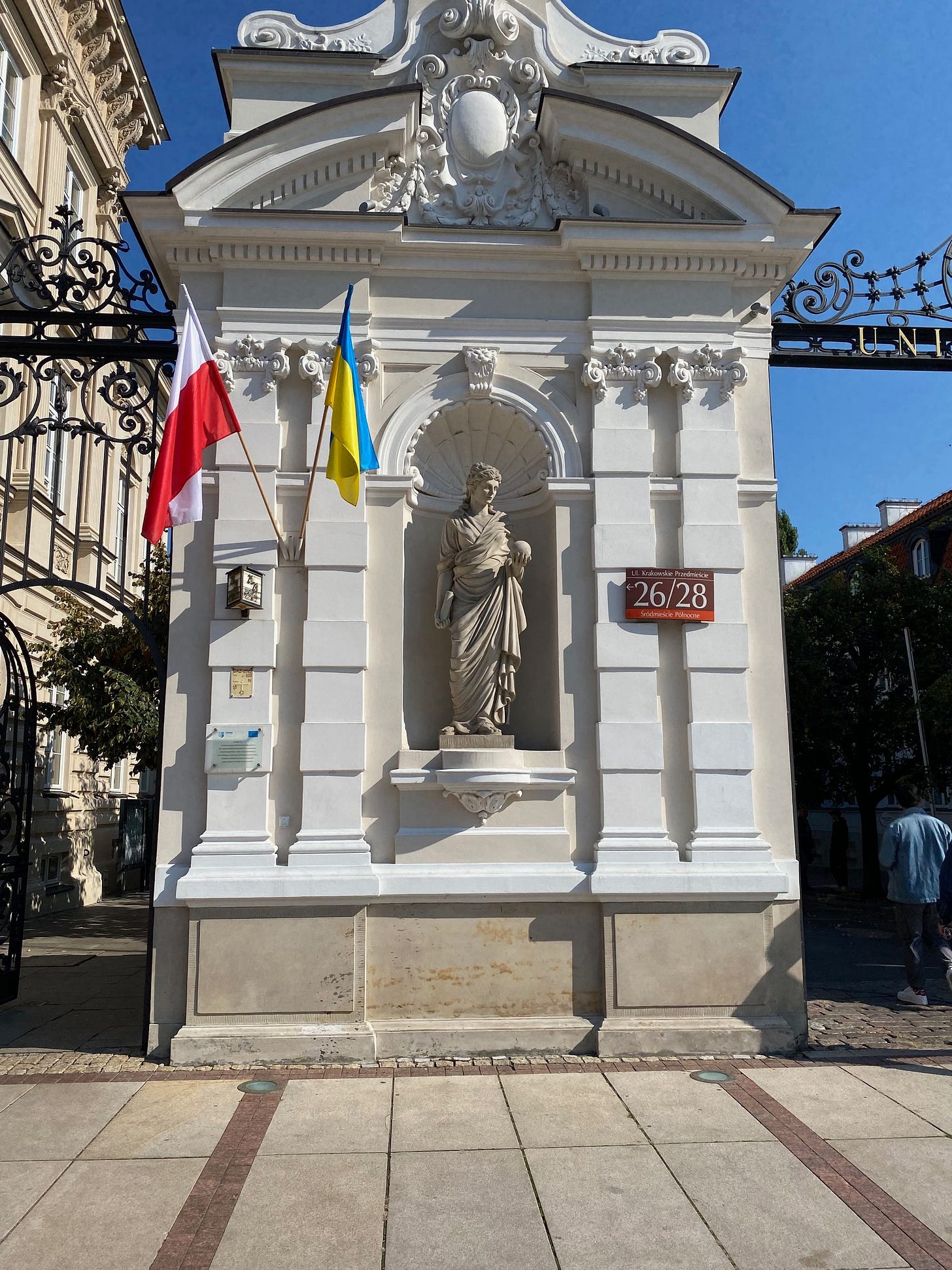Poland is with Ukraine.
I have returned from across the Atlantic and am now sifting through the hours and hours of interviews I conducted while traveling through Poland. Please bear with me while I am in writing mode.
It's been an incredibly intense news week, so you can skip to the bottom to see all that's transpired.
Otherwise, here are some photographs from Poland, a country with an omnipresent sense of its history, which occasionally feels like it's transformed over the past few months into an extension of Ukraine.
I took all of these with my iPhone.
What I'm reading:
On Putin's 70th birthday, the Nobel Peace Prize is awarded to a Russian human rights group that he shut down, a Ukrainian human rights group that is documenting his war crimes, and a Belarusian human rights activist whom his ally Lukashenko has imprisoned. https://t.co/5Yozif0Qis
— Kenneth Roth (@KenRoth) October 7, 2022
• The presidents of nine NATO countries from Central and Eastern Europe – the Czech Republic, Estonia, Latvia, Lithuania, North Macedonia, Montenegro, Poland, Slovakia, and Romania – issued a joint statement supporting Ukraine's bid for membership in the defense alliance. Bulgaria and Hungary did not sign on.
• The New York Times reported that the U.S. believes part of Ukraine's government authorized the car bomb attack that killed Russian nationalist ideologue Alexander Dugin's daughter, Daria Dugina, in Russia.
• CNN then confirmed the report, adding that it is still unclear who in Ukraine's government signed off on the assassination. U.S. officials believe Dugin, not his daughter, was the intended target.
• Russian politician Ksenia Sobchak tried to go to a bar in Tbilisi, Georgia. After being denied entry, she argued that the Russian occupation of Georgian territory and the invasion of Ukraine are unrelated. 🤦
Discussion between Ksenia #Sobchak and Dedaena Bar rep in #Tbilisi, after she was denied entry to the bar.
She just doesn't get it. They don't get it!
Another matter is why is she in #Georgia in the first place?!@GovernmentGeo?! pic.twitter.com/Ak41UXYoNT— Giorgi Tabagari (@Tabagari) October 4, 2022
• Russian exiles fleeing Russian President Vladimir Putin's military mobilization are relying on the hospitality of a Central Asian population that has suffered from stigmatization, racism, and discrimination under the pejorative label of "migrants" within Russian society, Foreign Policy reports.
• A pair of Russian nationals fleeing the country’s recent military call-up landed on a remote Alaskan island to seek asylum in the U.S., the Wall Street Journal reports.
• Armenia and Azerbaijan have agreed to a civilian EU mission alongside their border, where the worst fighting between the two countries since 2020 killed more than 200 people last month, Al Jazeera reports.
• Bosnia and Hercegovina held elections last weekend. The humiliating defeat of Bakir Izetbegović, leader of the main Bosniak political party, the Party of Democratic Action (SDA), in his race for a seat on the tripartite presidency, was the one of the biggest surprises of Bosnia’s elections, Balkan Insight reports. Another clear victor was Zeljka Cvijanović, from the leading Bosnian Serb party, the Alliance of Independent Social Democrats (SNSD). She defeated Bosnian Serb opposition leader Mirko Šarović in the race to become the next president of Bosnia’s Serb-dominated entity, Republika Srpska.
• The imposition of electoral law reform on election day in Bosnia threatens to undermine the country's democracy, Jasmin Mujanović writes for Al Jazeera. The "democratic breakthroughs by Bosnian voters were marred by the inexplicable decision by the country’s top international envoy, High Representative Christian Schmidt, to impose wide-ranging amendments to Bosnia’s election law only minutes after the polls had closed on Sunday," he writes. "In doing so, Schmidt helped deliver an extraordinary monopoly on power to one of the nationalist parties making up the ruling oligarchy."
• For Euronews, journalist Aleksandar Brezar explains who the High Representative is, what he changed, and how his decision affects Bosnia’s citizens.
• Bulgaria’s center-right GERB party – led by former long-serving Prime Minister Boyko Borissov – is set to win last Sunday’s election. But its chances of forming a coalition government remain unclear, Al Jazeera reports. Opposition parties have said they won't work with Borissov, who has been accused of widespread corruption.
• Around 10,000 people took to the streets of Budapest to protest cuts to the education budget and Viktor Orbán’s decision to fire teachers for protesting.
Thousands of students and teachers forming human chain in #Budapest this morning, ahead of today’s teachers’ strike, protesting low wages and lack of educational reform.
Last week, many teachers of a BP high school were dismissed for participating in a civil disobedience. pic.twitter.com/BrFyakmhsI— Viktória Serdült (@viktoriaserdult) October 5, 2022
• Slovenia became the first post-communist country to legalize same-sex marriage and adoption, Euronews reports.
• Splits in the governing U.K. Conservative Party burst out into the open when senior Tory Michael Gove suggested he might vote against the “profoundly concerning” budget released by new Prime Minister Liz Truss, Politico Europe reports. The government put forward a plan that cuts taxes on the rich and is entirely at odds with the Bank of England’s policy recommendations.
• Brazil, the world’s fourth-largest democracy, voted last weekend. But neither far-right President Jair Bolsonaro nor the leftist former President Luiz Inácio Lula da Silva received the over 50 percent of the vote they would need to avoid a runoff. The next round of elections is on October 30. Lula is still the front-runner, the BBC reports.
• Haiti’s Prime Minister Ariel Henry appealed for international assistance after weeks of continuous unrest in the country, Axios reports.
• OPEC, the organization of 13 oil-producing countries, agreed on massive production cuts in an already tight oil market, signaling a major victory for Russia and a defeat for the U.S. and European Union. The first large production cut in over two years aims to raise prices.
The below comment from Senator Chris Murphy captures the mood amongst many Democrats, who are wondering why the U.S. maintains a relationship with autocrats intent on stabbing Washington in the back.
I thought the whole point of selling arms to the Gulf States despite their human rights abuses, nonsensical Yemen War, working against US interests in Libya, Sudan etc, was that when an international crisis came, the Gulf could choose America over Russia/China. https://t.co/szkePOGtJK
— Chris Murphy (@ChrisMurphyCT) October 5, 2022
• The Biden administration is preparing to scale down sanctions on Venezuela’s authoritarian regime to allow Chevron to resume pumping oil there, the Wall Street Journal reports.
• Iran’s Revolutionary Guard Corps continued to bombard opposition bases in the semi-autonomous Kurdistan Region of Iraq, the New York Times reports. Iran blames Iranian Kurdish groups for fomenting some of the protests that have gripped the country for almost three weeks.
Meanwhile, protests in Iran continue.
A girls' school in Iran brought a member of the IRGC-run Basij paramilitary to speak to students. The girls welcomed the speaker by taking off their headscarves & chanting "get lost, Basiji".
Teenage girls have been at the forefront of protests for days.pic.twitter.com/kvskgB8qas— Kian Sharifi (@KianSharifi) October 5, 2022
Things kicked off between North Korea and its neighbors this week. North Korea fired a ballistic missile without warning over Japan in a significant escalation of its weapons testing program. CNN reports that it was the first time North Korea fired a ballistic missile over Japan in five years.
• The U.S. and South Korea then launched a series of ballistic missile tests off the east coast of the Korean Peninsula, CNN reports.
• One of the South Korean missiles fired during live-fire exercises crashed, panicking confused residents in the city of Gangneung, the Associated Press reports.
• A day later, South Korea said 12 North Korean warplanes flew near its border, prompting it to launch warplanes in response, the Associated Press reports.
• Ahead of this month's communist party congress, Chinese leader Xi Jinping sent a stark warning against disloyalty to the top ranks of the ruling party, the Financial Times reports.
• A semblance of normality is gradually returning to Burkina Faso following last Friday's coup, led by little-known Captain Ibrahim Traore. But neighboring countries are watching the political turmoil with growing concern, Deutsche Welle reports.
What the State Department says:
You can write to me for any reason: c.maza@protonmail.com















